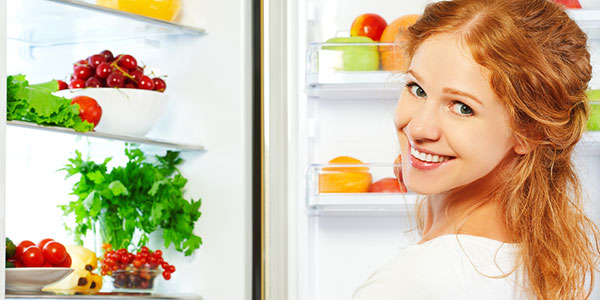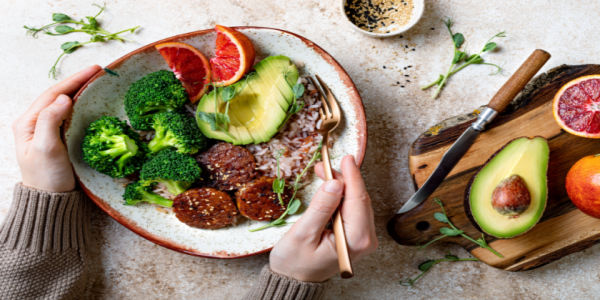
You made a huge effort to introduce more fruits and veggies into your diet. But when coming home after a grocery store trip, how do you unload fresh produce to maximize the freshness?
When it comes to the best produce storage, practices vary. Spoiling times and temperature environments are factors that dictate how to keep fruit fresh and how to store vegetables. Below helps guide the best way to store fruits and vegetables.
Fruits
Apples
Fruit bowls generally feature apples that are sat out on counters. Although room temperature is okay for up to three days, refrigerating apples can increase freshness for up to three weeks!
Bananas
If green and unripe, keep the bananas out on a dry counter. After ripening, the bananas (remaining in the peel) can be stored in the fridge for up to two weeks. Bananas pulled individually from the bunch, or with the tops wrapped with plastic wrap, can further slow down the ripening process. Bananas thrown in a brown paper bag can help speed up the ripening process.
Berries
When coming home with fresh berries, clean them with one-part vinegar to three-parts water. Rinse and strain in colander and transfer to a baking sheet and paper towel to rid moisture. Store in a glass container in the fridge for up to two weeks!
Grapes
When choosing grapes, look for green stems that are firmly connected to the fruit. Brown stems generally mean the grapes are extremely ripe, thus quickening their spoiling time once home. Grapes should be stored immediately in the fridge and in an airtight bag or container. Place away from strong-odor foods (think onions) to avoid unwanted flavors on grapes. Wash only prior to use to rid any bacteria and consume within 72-hours. Separate grapes if buying in bulk to promote air circulation.
Peaches
Until ripe, peaches should be stored at room temperature with the stem placed down. Once peaches start to smell sweet, store peaches in a plastic bag and place in the fridge to keep freshness.
Summer Squash
When choosing yellow squash and zucchini, make they are firm with bright-colored skins. Store unwashed, in a plastic bag, and in the refrigerator. For optimal freshness, use within three to five days.
Tomatoes
Whether you believe tomatoes are a fruit or vegetable, it provides the same care when it comes to storage. Tomatoes should be kept at room temperate and never stored in a plastic bag. If you want or need to speed up the ripening process, place tomatoes in a pierced paper bag with an apple or banana.
Watermelon
A ripe watermelon can be determined by firmly tapping the rind. If you hear a hollow thump, the watermelon is more than likely ripe. Whole watermelons can be left on the counter for up to two weeks while cut watermelon slices can be concealed tightly and refrigerated for up to three days.
Vegetables
Asparagus
When choosing fresh asparagus, look for tight and slightly purple tips and green bodies. Typically, asparagus should be used right away. For best storing practices, cut the ends off asparagus and place in a container with water, resembling flowers in a vase. Cover the top with a Ziploc bag and place in fridge for five to seven days.
Bell Peppers
Store unwashed bell peppers in a plastic bag and in the vegetable crisper. Interestingly, red and yellow peppers will last four to five days while green peppers can last about a week.
Carrots
Cut off the tops, or greens, of fresh carrots. When tops are intact, they pull moisture away from the actual carrot and cause them to become dry and cracked. Place carrots in a tightly-sealed container or bag and store in the coldest part of the fridge. Other root vegetables, such as beets, can also benefit from the same storage tip.
Corn
For the freshest corn on the cob, look for a tightly wrapped husk that are grassy green in color. The silk surrounding should be a glossy, pale yellow. When storing fresh corn, leave it unshucked, in a bag, and in the refrigerator. Although corn is best within a day of purchasing, it can last up to three days.
Mushrooms
Since mushrooms quickly absorb water, only rinse prior to their use. If planning to store, wrap mushrooms into paper towels and place in an open plastic or paper bag and use as soon as possible.
Potatoes
Smooth and firm potatoes should be stored in a well-ventilated, cool environment. Cold temperatures, such as in a refrigerator, can result in discoloration and a sweet taste once the potato is cooked.
Zucchini
A fresh zucchini is fairly heavy for itself, meaning there is high water content, which is ultimately desired. Look for long stems and smooth skin, as shriveled skin generally means the zucchini is past its prime. Store unwashed and uncut zucchini in a loosely closed Ziploc bag. Place in crisper drawer for seven to 10 days.







